Top AI Crypto Trading Bot: Maximize Your Profits with Smart Automation
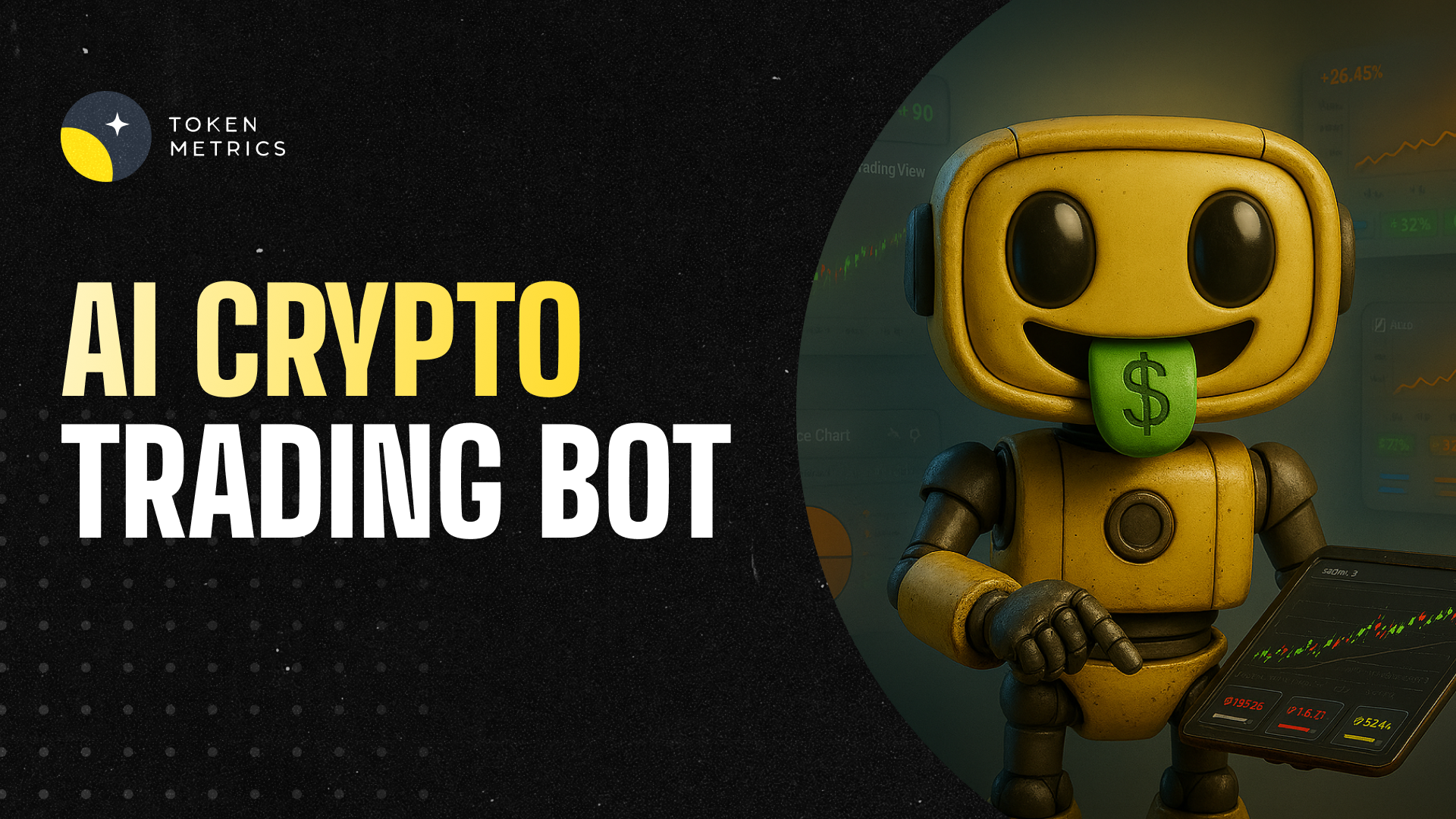
In the rapidly evolving world of cryptocurrency, staying ahead of market movements can be the difference between profit and loss. Enter the AI crypto trading bot—a powerful tool that’s transforming how traders and investors approach the crypto markets. AI crypto trading bots automate trades using advanced algorithms, making them indispensable in the fast-paced crypto environment. In 2025, AI bots are not just optional tools—they’re essential companions in navigating the complexities of digital asset trading, including market volatility. No matter where you are on your crypto journey, AI crypto trading bots can provide valuable support and guidance to help you achieve your trading goals.
What Is an AI Crypto Trading Bot?
An AI crypto trading bot is an automated software program that uses artificial intelligence and machine learning algorithms, as well as advanced algorithms, to buy, sell, and manage cryptocurrencies on behalf of users. Unlike traditional bots that follow pre-programmed rules, AI bots learn from historical data, identify patterns, adapt to market conditions, and optimize trading strategies in real time. These bots analyze data, spot trends, and trade without constant human monitoring, making them highly efficient tools for modern traders.
These bots can analyze massive amounts of data—including price trends, social sentiment, on-chain analytics, and macroeconomic signals—faster and more accurately than a human ever could. They operate 24/7, allowing users to make trades even while busy with other tasks. However, bots rely on historical data and preset strategies, which means their effectiveness can be limited in unpredictable market conditions. Understanding this reliance is important for users who want to maximize the benefits of AI trading bots.
How Do AI Trading Bots Work?
AI trading bots work by integrating with crypto exchanges via APIs. Once connected, they can execute trades automatically based on predefined goals, risk parameters, and learned behavior from historical data. Here’s how the process typically works:
- Data Collection: The bot scrapes and aggregates data from exchanges, news outlets, Reddit, Twitter, and blockchain analytics.
- Signal Generation: The AI processes this data to detect patterns, trends, and potential entry/exit signals.
- Decision Making: Using predictive models, the bot determines optimal trade actions.
- Execution: Orders are placed directly on exchanges in real time, often across multiple assets, trading pairs, and multiple exchanges.
- Portfolio Management: Some bots rebalance portfolios, take profits, and manage risk based on evolving strategies. Users can also track performance and monitor performance of trading strategies and bots over time to ensure optimal results.
Key Features of AI Crypto Trading Bots
AI-powered crypto bots offer a wide range of advanced features that make them stand out from manual or rule-based trading:
- User Friendly, Intuitive, and Easy to Use Interface: Enjoy an easy to use interface with intuitive navigation and simple setup, making it accessible for both beginners and experienced traders.
- Advanced Tools: Access advanced tools such as sentiment analysis, backtesting, and performance analytics to optimize your trading strategies.
- Strategy Templates & Custom Strategies: Use ready-made strategy templates or create custom strategies tailored to your trading goals.
- Support for Various Strategies: The bot supports various trading strategies, including DCA bot, grid bot, options bots, and market making, providing flexibility for different trading styles.
- Trading Signals: Leverage trading signals to automate and customize your strategies for more effective trading.
- Broad Market Access & Major Exchanges: Enjoy broad market access with support for major exchanges like Binance, Coinbase, and Kraken, enabling seamless trading across multiple exchanges.
- More Bots for Increased Automation: Deploy more bots to diversify your approach and increase automation capabilities.
- Continuous Operation & Market Adaptation: The bot supports continuous operation and adapts to changing market conditions for optimal performance.
- Affiliate Program: Benefit from an affiliate program that rewards you for referring new users.
- Transparent Pricing: Experience transparent pricing with no hidden fees and clear transaction fees, so you always know your costs.
- Dollar Cost Averaging: Automate dollar cost averaging as a supported strategy to minimize risks and smooth out market volatility.
- Social Trading: Participate in social trading by following or copying top traders' strategies within the community.
- Suitable for All Levels: Designed for both experienced traders, advanced traders, and beginners, offering sophisticated features and user-friendly tools.
- Right Bot & Best Bots: Choose the right bot for your needs, including access to some of the best bots for superior performance.
- Performance in Diverse Market Conditions: Bots are built to perform well in diverse market conditions, adapting to bull, bear, and sideways markets.
- Align with Risk Tolerance: Customize strategies to match your personal risk tolerance for safer trading.
- Past Performance Disclaimer: Remember, past performance is not indicative of future results—always trade responsibly.
- Minimize Risks: Advanced algorithms help minimize risks and protect your portfolio during volatile periods.
- Exploit Market Inefficiencies: Take advantage of market inefficiencies for better trading outcomes.
- Reliable Customer Support: Access reliable customer support to resolve issues quickly and ensure a smooth trading experience.
- Trading Success & Informed Trading Decisions: All these features contribute to trading success and help you make informed trading decisions.
- 24/7 Automated Trading: Bots never sleep, making them ideal for the non-stop crypto market.
- Real-Time Sentiment Analysis: They monitor social media and news feeds to respond to hype cycles or FUD (fear, uncertainty, and doubt).
- Adaptive Learning: AI bots can adjust their strategy over time using reinforcement learning or neural networks.
- Backtesting & Simulation: Test strategies on historical data to evaluate performance before going live.
- Multi-Exchange Support: Trade across Binance, Coinbase, Kraken, and more, all from one dashboard.
- Risk Management: Set stop-losses, take-profits, and manage exposure using AI-calculated thresholds.
Benefits of Using AI Trading Bots in 2025
1. Emotion-Free Trading
Human traders are often influenced by greed, fear, or impatience. AI bots follow data—not emotion. This leads to more disciplined and consistent trading. By removing emotional biases, these bots enable traders to make data-driven decisions, which can significantly improve trading outcomes.
2. Speed and Efficiency
Crypto markets move fast. AI bots can analyze, decide, and execute trades within milliseconds—far faster than any human trader.
3. Scalability
Bots can manage multiple trades and portfolios simultaneously, something that would be overwhelming for a human.
4. Data-Driven Strategy
AI bots can process terabytes of data in seconds, including sentiment analysis, news trends, and historical performance, ensuring informed decisions.
5. Access to Advanced Strategies
Some AI bots come with built-in hedge fund-level algorithms, giving retail traders access to institutional-grade tools.
Common Use Cases for AI Crypto Bots
- Scalping and High-Frequency Trading (HFT)
- Trend Following and Momentum Trading
- Mean Reversion Strategies
- Arbitrage across Exchanges
- Portfolio Rebalancing
- Narrative-driven trading (e.g., AI tokens, meme coins, etc.)
- Paper Trading and Strategy Testing: Use paper trading to test and refine trading strategies in a risk-free environment, helping users gain experience and manage risk without using real money.
Crypto trading bots can be programmed to follow specific trading strategies, such as trend following, arbitrage, or market making, offering flexibility to suit various trading styles.
Token Metrics AI Crypto Trading: Smarter Crypto Decisions in 2025

One of the standout platforms in the AI crypto trading space is Token Metrics. Their AI crypto trading leverages over 80 on-chain and off-chain data points to generate real-time bullish and bearish signals. Platforms like Cryptohopper and 3Commas also allow users to customize and test their own bots, providing flexibility and control over trading strategies.
Why Token Metrics Stands Out:
- Trader and Investor Grades: Proprietary scoring systems for different time horizons.
- Backtested Accuracy: Up to 97% signal accuracy during market trends.
- Narrative Detection: Identifies emerging crypto themes before they pump.
- Telegram and Email Alerts: Stay updated wherever you are.
- Portfolio Builder: Automate your crypto portfolio based on AI-driven indices.
Whether you're a beginner or an advanced trader, Token Metrics makes it easy to integrate AI into your crypto trading strategy.
Crypto Trading Bot Security: Protecting Your Digital Assets
In the world of crypto trading, security is not just a feature—it’s a necessity. As more traders turn to automated trading and AI-powered trading bots to enhance trading efficiency, the need for robust security measures becomes even more critical. Choosing a bot with robust security measures is essential for protecting funds and personal information. A secure crypto trading bot ensures that your digital assets remain protected while you execute trades and manage your portfolio in real time.
When selecting a crypto trading bot, look for platforms that implement advanced security measures at every level. This includes secure API key management, where your exchange accounts are connected using encrypted keys that limit access and permissions. Leading trading bots also offer two-factor authentication (2FA), adding an extra layer of protection to your account and trading activities.
Encryption is another cornerstone of a secure trading experience. Top crypto trading bots use end-to-end encryption to safeguard sensitive data, ensuring that your personal information and trading strategies remain confidential. Regular security audits and updates are essential, as they help identify and patch vulnerabilities before they can be exploited.
For users, adopting best practices is equally important. Always use strong, unique passwords for your trading bot accounts, enable 2FA wherever possible, and regularly monitor your account for any unusual activity. Avoid sharing your API keys or login credentials, and be wary of phishing attempts that could compromise your security.
Ultimately, the best AI powered trading bots combine advanced features with robust security measures, allowing traders to focus on their trading strategies without worrying about the safety of their assets. By choosing a reputable crypto trading bot and following recommended security practices, you can enjoy a seamless and secure automated trading experience in the ever-evolving cryptocurrency market.
Risks and Considerations
While AI bots offer many benefits, it is important to understand the risks involved. Consider the following:
- Overfitting: Bots trained on historical data may not adapt well to future conditions.
- False Signals: Even AI can misinterpret noise as opportunity.
- Security Risks: Always use secure platforms and APIs. Bots with exchange access can be vulnerable.
- Dependence on Quality Data: Garbage in, garbage out. A bot is only as good as the data it processes.
AI trading bots can deliver initial profits but may lead to losses as market conditions change, highlighting the importance of continuous monitoring and strategy adjustments.
- Overfitting: Bots trained on historical data may not adapt well to future conditions.
- False Signals: Even AI can misinterpret noise as opportunity.
- Security Risks: Always use secure platforms and APIs. Bots with exchange access can be vulnerable.
- Dependence on Quality Data: Garbage in, garbage out. A bot is only as good as the data it processes.
Choosing the Best AI Crypto Trading Bot
When evaluating an AI bot, it's crucial to choose the right bot to optimize your trading outcomes. Consider the following criteria:
- Transparency: Are the strategies explainable? Are performance metrics public?
- Customizability: Can you tweak parameters or build your own strategies?
- Backtesting Tools: Does the platform offer sandbox testing?
- Community & Support: A strong user base and developer support are essential.
- Security: Ensure the platform uses secure API key handling and encryption.
Identifying your investment goals and risk tolerance is crucial when selecting a crypto trading bot, as this ensures the bot aligns with your trading objectives.
- Transparency: Are the strategies explainable? Are performance metrics public?
- Customizability: Can you tweak parameters or build your own strategies?
- Backtesting Tools: Does the platform offer sandbox testing?
- Community & Support: A strong user base and developer support are essential.
- Security: Ensure the platform uses secure API key handling and encryption.
Conclusion: The Future of Crypto Trading Is AI-Powered
In 2025, AI crypto trading bots are no longer the future—they are the present. They offer faster execution, smarter strategies, and continuous optimization that outperform manual efforts. Whether you’re aiming to automate your trades, minimize emotional errors, or gain a competitive edge, AI bots are powerful tools to add to your arsenal.
Platforms like Token Metrics are leading the way in democratizing access to AI-driven trading. With the right setup, knowledge, and risk controls, AI crypto trading bots can help you navigate the volatile crypto market with confidence and precision. Successful deployment of AI bots hinges on combining technical prowess with prudent risk management and continual oversight, ensuring long-term trading success.
Create Your Free Token Metrics Account

.png)




%201.svg)
%201.svg)


%201.svg)



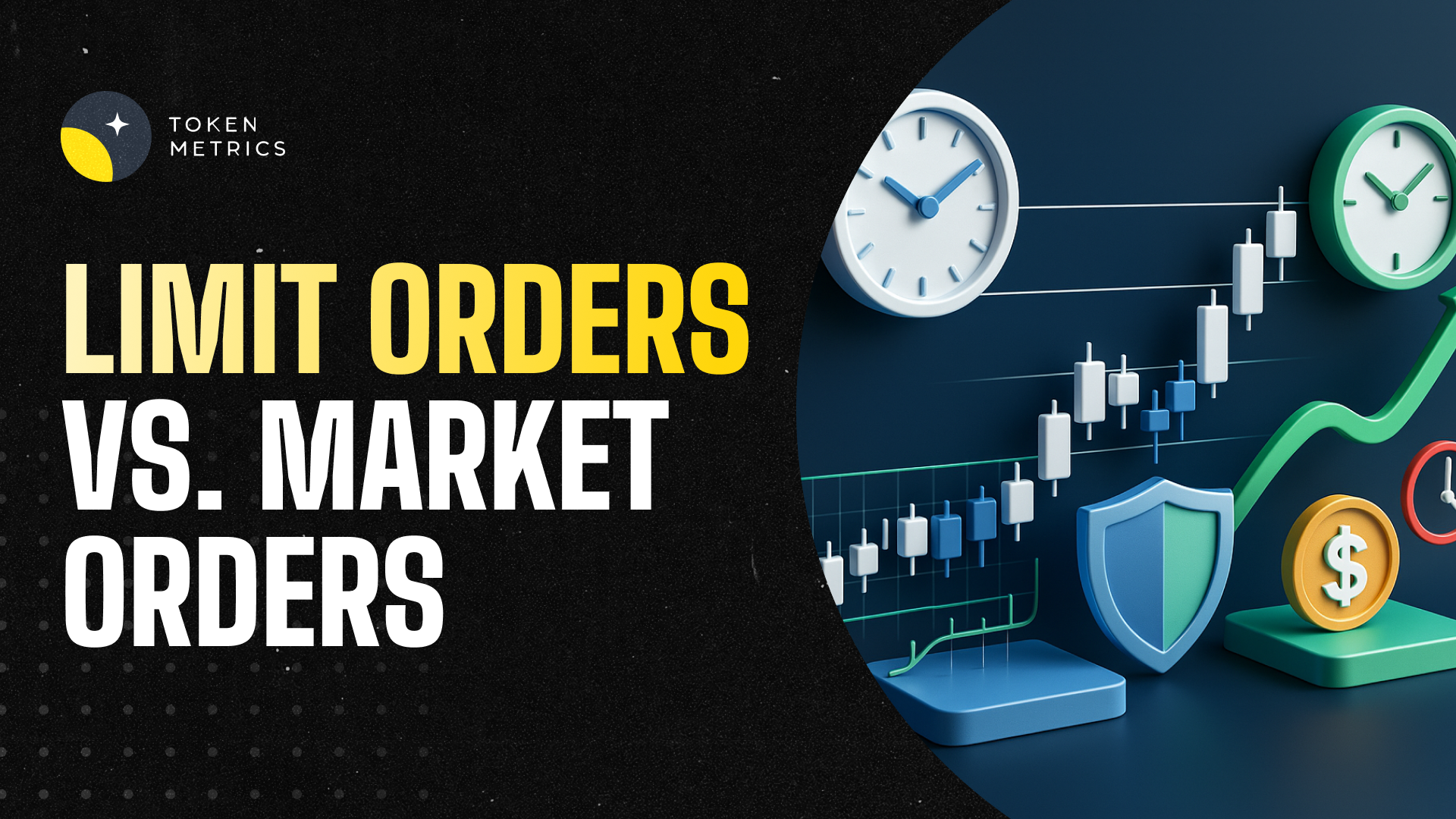
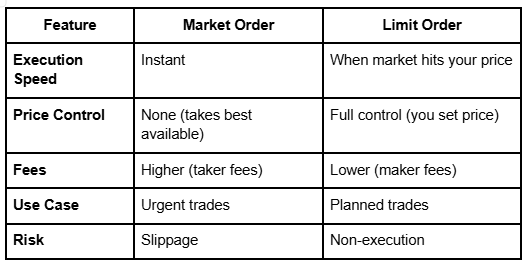

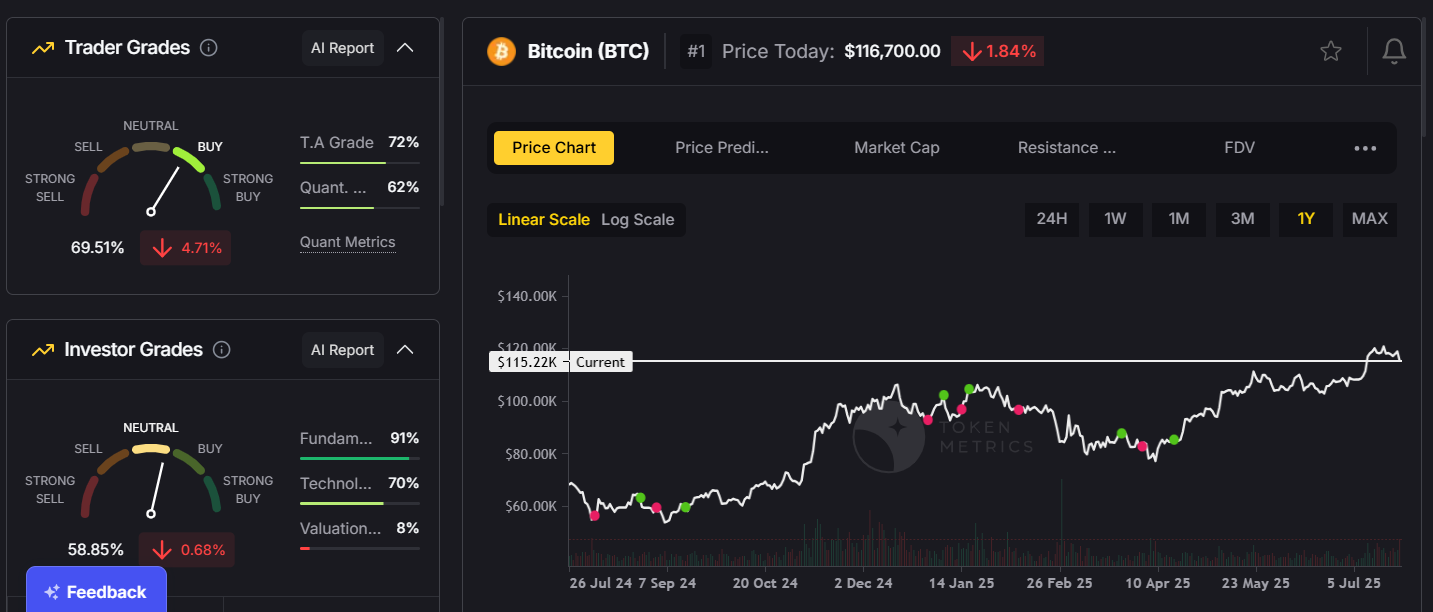

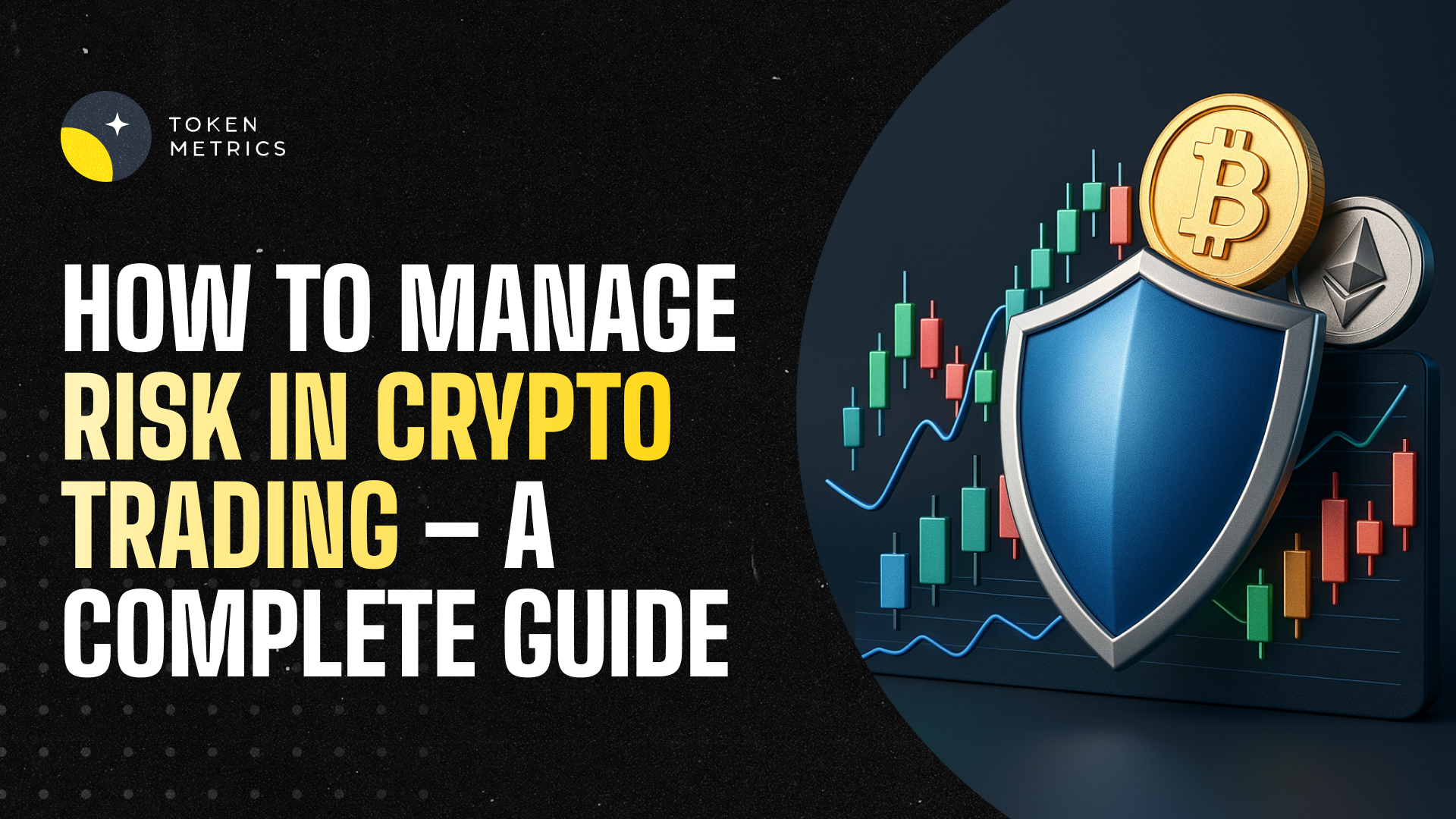



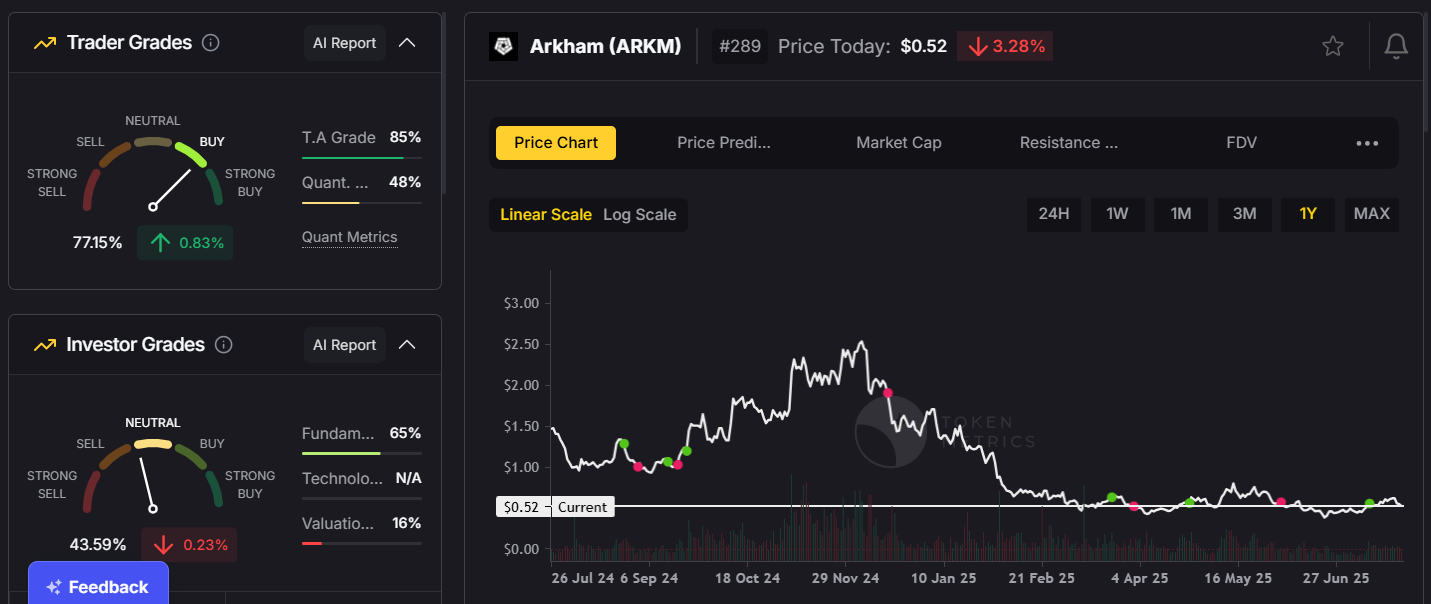




.svg)




.png)